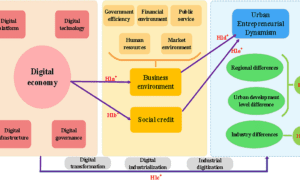In today’s hyper-connected world, digital marketing is no longer optional, it’s essential. As consumers increasingly turn to search engines, social media, and online shopping, businesses must meet them where they are: online. That’s where digital marketers come in. These professionals are the architects behind a brand’s online presence, using data-driven strategies and creative execution to attract, engage, and convert customers across digital channels. Companies like https://www.oregonwebsolutions.com specialize in providing comprehensive digital marketing services that help businesses thrive in the competitive digital landscape.
But what does a digital marketer actually do on a day-to-day basis? The answer is multi-faceted. Let’s take a deep dive into the many roles they play, the skills they leverage, and the tools they use to drive results in the digital realm.
- Strategic Planning and Campaign Development
Digital marketing starts with strategy. A digital marketer works closely with business stakeholders to set objectives and define the most effective ways to achieve them online.
Key Activities:
- Setting SMART Goals: Specific, Measurable, Achievable, Relevant, and Time-bound goals ensure every campaign has a clear direction.
- Creating Marketing Funnels: From awareness to conversion, digital marketers map out customer journeys to guide prospects through the buying process.
- Cross-Channel Integration: Coordinating efforts across SEO, social media, email, and paid advertising to ensure consistency and maximize ROI.
For example, an e-commerce brand launching a new product might create a launch campaign involving teaser videos on Instagram, retargeting ads on Facebook, product demos on YouTube, and email newsletters, all planned and executed by a digital marketer.
- Search Engine Optimization (SEO)
SEO is one of the most cost-effective long-term digital strategies. It involves optimizing content and website structure so search engines can understand and rank it for relevant searches.
Core Responsibilities:
- On-page Optimization: Updating title tags, meta descriptions, internal linking, and content to align with keyword strategies.
- Technical SEO: Ensuring fast load times, mobile responsiveness, secure HTTPS, structured data markup, and XML sitemaps.
- Content Strategy: Developing blogs and articles based on keyword trends and search intent.
- Off-page SEO: Building backlinks from credible sources to boost domain authority.
Tools used: Google Search Console, Ahrefs, SEMrush, Screaming Frog
- Pay-Per-Click Advertising (PPC)
Digital marketers also run paid media campaigns to quickly generate traffic, leads, and sales. These ads appear on platforms like Google, YouTube, LinkedIn, Facebook, and Instagram.
Key Components:
- Audience Targeting: Using demographics, behaviour, location, and interests to show ads to the right users.
- Ad Creation: Writing compelling copy and designing attention-grabbing visuals.
- Landing Page Optimization: Ensuring landing pages align with the ad message and encourage conversions.
- Budget Management: Allocating spend across campaigns to maximize cost-efficiency and minimize wasted clicks.
Metrics tracked: Cost-per-click (CPC), Conversion Rate, Quality Score, Return on Ad Spend (ROAS)
- Social Media Management and Marketing
Social media is more than likes and shares—it’s a direct line to your audience. Digital marketers develop a brand voice and maintain a consistent presence on the platforms most relevant to their target demographic.
Tasks Include:
- Content Scheduling and Publishing: Using tools like Buffer or Hootsuite to maintain a regular posting cadence.
- Engagement: Responding to comments, messages, and mentions to build community trust.
- Influencer Collaboration: Partnering with influencers for expanded reach and credibility.
- Ad Campaigns: Running paid promotions to boost engagement and conversions.
Each platform (Instagram, LinkedIn, TikTok, Twitter, Facebook) has different best practices and audiences, which digital marketers tailor their approach to.
- Content Marketing and Storytelling
Content is the fuel that powers many digital strategies. A digital marketer may lead content creation efforts that provide value to the audience while aligning with brand goals.
Examples of Content:
- Educational blog posts that address customer pain points
- Thought leadership whitepapers or e-books
- Entertaining videos or reels for social engagement
- Product tutorials or customer testimonials
- Infographics that visualize key data
Great content builds trust, drives traffic, and positions the business as an authority in its industry.
- Email Marketing and Automation
Email remains one of the highest ROI digital channels. Digital marketers craft email campaigns that nurture leads and keep existing customers engaged.
Responsibilities:
- List Building: Encouraging users to subscribe via website popups or lead magnets.
- Segmentation: Grouping contacts based on demographics, behaviour, or past purchases.
- Automation: Setting up triggered emails (e.g., welcome sequences, cart abandonment, re-engagement).
- Testing and Optimization: Running A/B tests on subject lines, designs, and calls to action.
Platforms used: Mailchimp, Klaviyo, ActiveCampaign, HubSpot
- Data Analytics and Reporting
What sets digital marketing apart is its measurability. Digital marketers constantly analyse campaign performance to make informed decisions and maximize results.
Tools and Techniques:
- Google Analytics & GA4: For tracking website traffic, user behaviour, and conversions.
- UTM Tracking: To track source, medium, and campaign for precise ROI calculations.
- CRM Dashboards: To evaluate how leads are progressing through the sales funnel.
- A/B Testing Results: To refine ad creatives, email subject lines, or landing page designs.
Data insights help marketers pivot strategies, eliminate underperforming tactics, and double down on what works.
- Marketing Technology and Automation Tools
To scale efforts efficiently, digital marketers use a suite of tools that automate tasks, gather data, and personalize experiences.
Common Tools:
- Marketing Automation: HubSpot, Marketo, Pardot
- CRM Systems: Salesforce, Zoho, Pipedrive
- Collaboration Tools: Asana, Trello, Slack
- Design Tools: Canva, Adobe Creative Suite
- Heatmaps and Behaviour Tracking: Hotjar, Crazy Egg
Understanding how to configure and optimize these tools is a core skill for advanced digital marketers.
Soft Skills That Make a Great Digital Marketer
While technical ability is important, soft skills often differentiate a good digital marketer from a great one:
- Creativity: Crafting original content and compelling campaigns.
- Analytical Thinking: Making data-driven decisions and interpreting complex reports.
- Adaptability: Keeping up with changing algorithms, tools, and trends.
- Collaboration: Working with cross-functional teams like design, sales, and IT.
- Customer Empathy: Understanding the customer journey to deliver value at every touchpoint.
The Digital Marketer’s Value
A digital marketer is not just a technician or content creator, they’re a strategist, a brand advocate, a data scientist, and a storyteller rolled into one. Their work fuels brand visibility, drives measurable results, and enables businesses to thrive in an increasingly digital-first economy.
Whether managing a solo startup campaign or orchestrating a multi-million-dollar corporate strategy, digital marketers are the linchpin between technology and consumer connection. In a world where attention is currency, they ensure that businesses not only earn it but keep it.





























